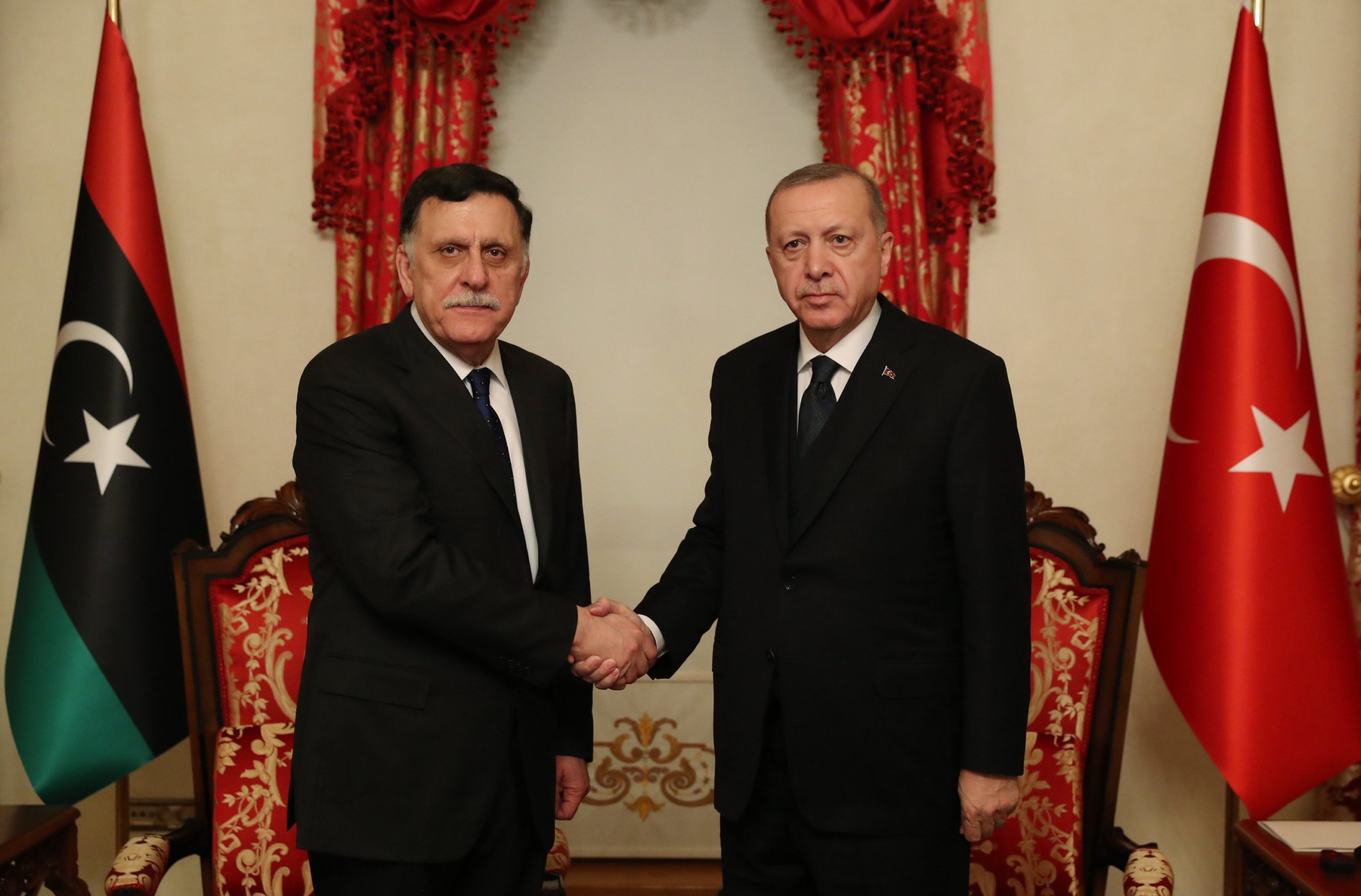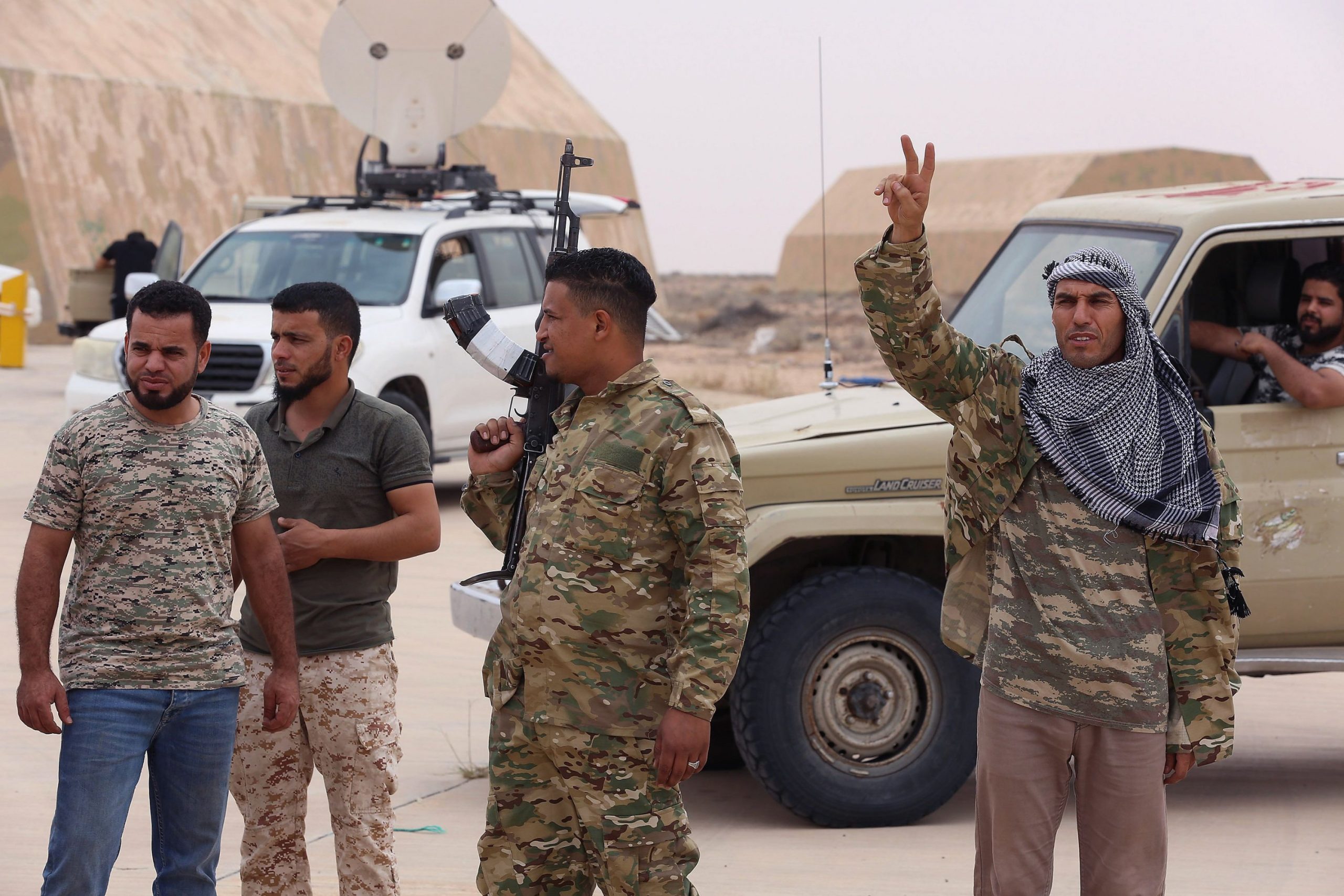Cooperation between Ankara and Tripoli has shifted the balance of power in the Libyan Civil War, Ahmed Maiteeq, the deputy prime minister of the war-torn country said on Thursday.
Speaking at an online panel organized by Washington, D.C.-based think tank Atlantic Council, Maiteeq highlighted the damages that putschist Gen. Khalifa Haftar had inflicted on the country thanks to the backing of countries like Russia and United Arab Emirates (UAE), as well as the significance of Turkey’s support to the Libyan government in its fight.
“The Russian presence in Libya and the belief that Haftar would soon be able to take control of the whole country enabled Haftar’s militias to make significant gains on the ground. However, the deal that was signed with Turkey and cooperation between both countries has changed the balance of power,” Maiteeq underlined.
Since the ousting of late dictator Moammar Gadhafi in 2011, two seats of power have emerged in Libya: Haftar in eastern Libya and the Government of National Accord (GNA) in Tripoli, which enjoys U.N. and international recognition.
The civil war has seen a critical reversal recently as, thanks to Turkey’s support, the United Nations-backed Libyan Army has been advancing – gradually making one strategic gain after another.
Libya and Turkey signed agreements in November outlining cooperation in terms of military and maritime affairs. Following the deal, the Turkish Parliament in January passed a motion allowing for the deployment of troops to Libya for one year in order to respond to threats from illegitimate armed groups and other terror groups working against both countries’ national interests.
“Currently,” Maiteeq expressed, “our forces have the technology to defend Tripoli. Plus, the fact that Russia’s Wagner mercenaries had to retreat due to their recent losses has put Haftar in a very difficult position. If he loses Tarhouna and surrounding regions in the upcoming days, it will be even more difficult for Haftar to recuperate.”
Recently, the Libyan civil war made headlines with the critical al-Watiya air base passing into the hands of GNA forces, who liberated the base from the occupation of the Haftar’s militias. The move came after the Libyan Army destroyed three other Russian-made Pantsir-type air defense systems used by Haftar’s forces that had been supplied by the UAE.
Since the beginning of the civil war, western Libya has been the site of two crucial supply centers belonging to Haftar’s forces, which are mainly based in the eastern parts of the country, particularly around Benghazi. Haftar’s militias have been delivering supplies coming from the east to these two centers in the west: al-Watiya air base and the Tarhuna region. The next target for the GNA is expected to be the latter supply point.
These gradual advancements by the GNA and determined steps to completely secure Tripoli have had an impact on Haftar’s militias and their supporters not only in terms of military losses but in terms of momentum.

Russia, UAE damages Libya’s future
Highlighting that neither Russia nor the UAE had any concrete plan for Libya’s future apart from eliminating the Libyan government, the deputy prime minister stated that if Haftar somehow prevailed, Libya would enter into a yet another dictatorial period.
The UAE has spent a fortune supporting Haftar, despite his failures, against the country’s U.N.-recognized government. Despite the international arms embargo on the war-torn country in place since 2011, the UAE has been continually looking for ways to get heavy and strategic weapons to Haftar and his forces in eastern Libya to overthrow the government since 2014.
U.N. reports reveal that Egypt is also involved in violations in Libya, allowing the UAE to use its territory as a supply base.
However, the UAE and Egypt are not the only countries that support the illegitimate Haftar militias in Libya. The involvement of Russia, in particular, in the process has been reported many times by international agencies.
A confidential U.N. report by experts monitoring the arms embargo confirmed the presence of troops from Russia’s Wagner Group in Libya, as well as Syrian fighters from Damascus – both supporting Haftar in the region.
The latest transfer of Syrian fighters to Libya via Russia took place on Thursday as local sources confirmed that Damascus sent 150 fighters to join Haftar as mercenaries. The Syrian mercenaries will receive between $1,000-1,500 from Russia in return for their services, the sources added.
A similar transfer of fighters took place 10 days ago, with 600 mercenaries from Syria’s Homs province having been brought to Libya by Russia.
U.S. involvement in conflict
According to Maiteeq, the countries backing Haftar, especially the UAE, are counting on their close ties with the U.S. to allow them to continue their involvement in Libya. The international community, particularly Washington, should take action against them, Maiteeq declared.
Recently, the U.S. has started to take steps to increase its influence over Libya, with the aim of enabling the country to embark on a political process that would put an end to the conflict. On Wednesday, the U.S. ambassador to Libya held a phone call with the mayor of Zintan, a city located 170 kilometers (105.6 miles) southwest of Libya’s capital Tripoli, to discuss the latest situation in the region.
“Ambassador (Richard) Norland and Mayor of Zintan (Mustafa) Al Baroni discussed yesterday current developments and the desire of western Libyans to see an end to the offensive on Tripoli,” the U.S. embassy said on Twitter, Thursday.
“The Ambassador stressed that only a comprehensive political process can achieve peace and stability for #Libya,” it added.
Zintan is a stronghold that supports Libya’s internationally recognized government, however, almost half of its fighters under the command of Idris Madi are loyal to Haftar’s militia.
The city’s airport is under the control of Haftar’s militia, who use the facility to ship in further weapons and fighters.
Haftar shelling injures 3 civilians
According to the U.N. figures, since April 2019, after which the conflict intensified, Haftar’s militia has killed more than 1,000 civilians in various attacks that have mostly targeted residential areas.
The last assault by Haftar’s militia took place on Thursday, when at least three civilians were injured by shelling on a residential area in Tripoli.
“Three civilians, including two children, were wounded as a result of shelling by Haftar’s militia in the Ain Zara area,” Osama Ali, a spokesman for the Libyan government’s ambulance and emergency service, told Anadolu Agency (AA).
Maiteeq, referring to Haftar’s attacks on civilian settlements, including schools and hospitals, stated that countries – namely, Russia, the UAE, France and Egypt – were providing military and financial support to Haftar, while many others preferred to turn a blind eye to the putschist general’s brutalities.
Libyan economy shattered by war
Over the course of the panel conversation, a major point came in terms of the conflict’s damage to Libya’s economy, especially when it came to the energy sector.
Head of the Bosphorus Energy Club, Mehmet Öğütçü, emphasized the importance of Libya in the energy sector, stating that the country had the capacity to produce 1,7 million barrels of oil per day. However, Öğütçü said, due to the conflict, this amount had fallen to 92,000 barrels per day, which is a remarkable drop for a country that was a crucial provider of both oil and gas to Europe.
Libya is struggling with divided institutions, dysfunction, corruption, a struggling economy and very few or no oil revenues coming in. According to the U.N., since the blockade was imposed around mid-January, the country has lost $4 billion at least in oil revenues.
In Öğütçü’s opinion, in order to reconstruct the war-torn country, oil revenues are a must.
“It is very important for the international community to assist Libya’s development in the energy sector and enabling the country to regain its revenue resources. I believe that in two or three years, Libya will increase its oil production and start trade with especially the southern European countries,” he expressed.
Underlining the geopolitical importance of Libya, Öğütçü recalled that developments in the country were directly tied to the security of Africa, the Middle East and Europe.










Discussion about this post